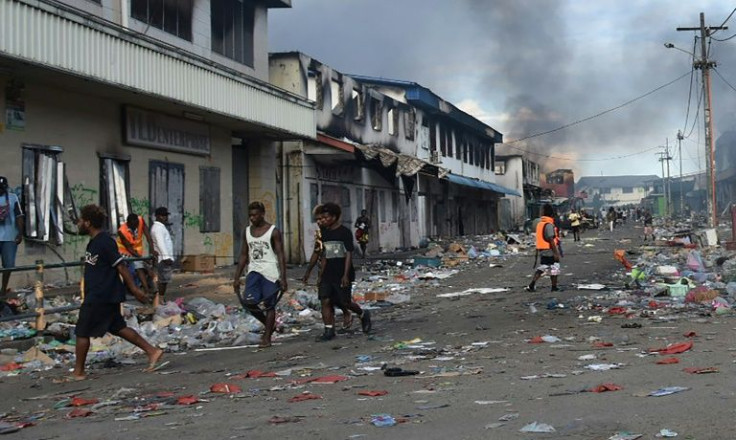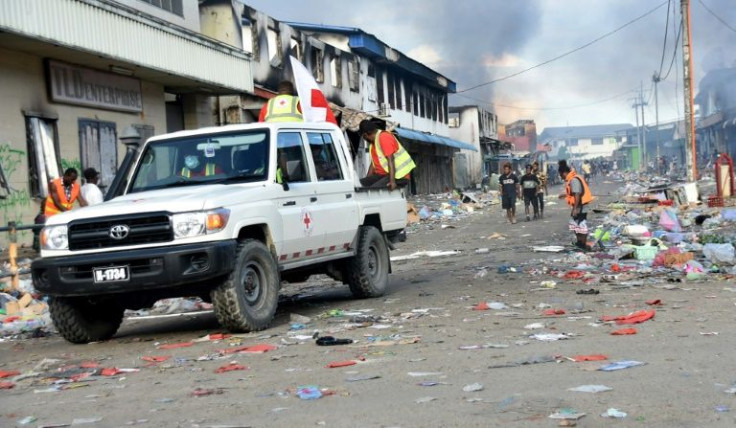What Next For Riot-hit Solomon Islands?
Three days of rioting have plunged the Solomon Islands into chaos, exposing widespread frustration at low living standards and revealing the government's inability to uphold the rule of law.
So what's next for the troubled South Pacific nation?
Embattled Prime Minister Manasseh Sogavare -- who narrowly avoided his Honiara home being torched Friday -- will hope that a night-time curfew and the presence of heavily armed Australian peacekeepers on the streets Friday will calm the restive capital.
The detachment of around 100 Australian police and military personnel, alongside 34 Papua New Guinean colleagues, will back up the overwhelmed Royal Solomon Islands Police Force whose weakness has been brutally exposed.
Despite years of overseas investment they were unable to control the violence, failing even to stop two of their own stations from being burned and making only two arrests despite days of violence.
One local resident estimated that at the height of the riots on Thursday they controlled only 30 percent of the capital, with the rest effectively controlled by the mob.

Canberra -- wary of repeating a 14-year peacekeeping deployment that only ended in 2017 -- has stressed this time they will only be there a couple of weeks.
After that, the Royal Solomon Islands Police Force will face a tough challenge to regain trust and develop into an effective peacekeeping force.
Sixty-six-year-old Sogavare has blamed the unrest on shadowy foreign powers and "certain elements" seeking to overthrow his government -- pointing to opposition over his decision to court Beijing and break ties with US ally Taiwan.
But others pointed away from high politics, toward a much more pressing politics of the belly.
The "Solomon Islands has been drifting to self-destruction," analyst Transform Aqorau wrote on the respected Devpolicy blog. "It is one of the most aid-dependent countries in the world."
Forty percent of the population is under 14, according to World Bank data, and an estimated 70 percent are under 30. There is no reliable unemployment data, but joblessness is endemic.

"We've had almost two years of Covid-19 restrictions now, people are starting to be hungry. They are hungry," said Douglas Kelson, chief officer of the county's St John Ambulance Service.
After two years without any tourism "most people are barely getting one meal a day," he said. "People do things they normally wouldn't when they are hungry."
The cost of reconstructing public buildings, offices and other businesses that were torched remains unknown and will only add to a burden the government already struggles to meet.
Even if Sogavare can avoid being deposed and reestablish some order with the help of foreign forces, many still want him to be removed from office.
His alleged favouring of the island of Guadalcanal over the more populous Malaita -- whose residents are believed to have sparked the first protests on Wednesday -- will continue to come under fire.
Australia is desperate not to be dragged into Sogavare's rivalry with the Malaitan leader Daniel Suidani, stressing they are there in a neutral peacekeeping force and not mediating between the two.
But it remains unclear if Solomon Islanders can reconcile their differences through existing political structures.
"Since independence of Solomon Islands in 1978, there have been calls for a decentralised system of governance with more autonomy to the provinces," wrote the Lowy Institute's Anouk Ride.
Sogavare's cosy ties with Beijing will also continue to come under scrutiny, fuelling widespread animosity toward foreigners, particularly the Chinese, whose businesses were targeted for attack during the riots.
The government is widely seen by Solomon Islanders as corrupt.
"Even though 80 percent of land in Solomon Islands is owned by Solomon Islanders, they are largely bystanders, while outsiders, mainly Malaysian, Filipino, and Chinese loggers and mining companies control the resources and the political processes involving our politicians," wrote Aqorau of Devpolicy.
The "riots are evidence of serious underlying currents that have been neglected. There has to be reform to the political system, including making the government more inclusive," he said.
© Copyright AFP {{Year}}. All rights reserved.




















